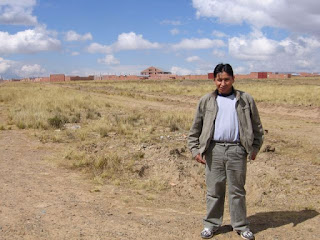 |
| Mama Coca - the place I am staying in La Paz with Bertha, her husband
Ricardo, and their 4 college age kids. Bertha who is Bolivian works
with Women's Rights, Fair Trade and Solidarity Economy on a regional and
national level. Ricardo is Italian and is now working on building
juvenile rehabilitation centers for incarcerated and sexually abused
delinquents. It's great staying here - I'm a block away from some of
the knitters I work with and right in the beginning of the city. Free
wifi in the tourist coffee ship is down the street - I buy an overpriced
$1.50 coffee and have internet use for the whole morning! |
 |
| "Chappy" my guide who brought me through the new urbanizations in El
Alto outside of La Paz to where the new coffee processing plant for the
ProAgro group is being built and used. Hiking in 30 minutes from the
main highway, passing hundreds of recently built houses and walled lots,
you arrive at the plant (with the large roof in the distance). El
Alto's urbanizaitons are growing at a very fast pace as people in the
countryside secure housing for times when they need access to a wage
economy and their farm production is not enough to cover all their needs
or there are new urban opportunities they want to participate in. To
start an urbanization a community comes in from the countryside and
squats a section of empty land. They divide it into plots, build walls
and houses (out of brick or adobe for protection from the cold),
organize with other neighbors, and present a community neighborhood plan
to the mayor. if the mayor accepts the plan the members get a title to
their land and if lucky electrical lines put in and eventually water.
The community pays for their own sewer lines. Eventually they will be
established enough with full time residents and businesses that their
roads will be cobblestone and then eventually paved and public
transportation and schools will be developed. This all takes about 5-10
years. Most sections of the urbanization, Tilata, are less than 2
years old. |
 |
| Installing the new equipment in the coffee processing facility. This
equipment will take the skin off the dried coffee beans. In the
background, sacks of dried beans await processing. |
 |
| The coffee beans get raked on the patio about 4-5 times a day until they
are completely dry. Climate change has resulted in late rains arriving
in the tropics causing the coffee to arrive in El Alto for it's second
drying, pretty wet. This could effect the quality of the coffee. Much
care has to be given to complete the second drying at exactly the right
level of humidity. The coffee get sorted into 4 grades. Though all is
Fair Trade and organic, - only the 1st grade is sold as both fair trade
and organic, the 2nd grade is sold as fair trade, and the rest is sold
as secondary quality coffee on the common market. Each blue bag is
marked from the farm it comes from and is worth (before the final
processing) about $170. Once it's processed and sorted the different
grades are sold at the market price for that grade. Farmers have 5-12
acre lots and produce about 1-5 big blue bags of coffee each a year.
The coffee raker is wearing a face mask to protect himself from the cold
and the sun. Ilimani, the great protector mountain of La Paz, is in
the background. It's entering into the dead of winter and snowed a bit this morning. |
 |
On another note... Miners walked about 10 days from Potosi to La Paz to
protest the privately owned mines and environmental damages the mines
are causing. They want the mines nationalized and/or cleaned up. |
Next stop - the tropics!
*FIESS - International Federation of Social Solidarity Economy - an global network of academics, professionals, and governments working together for a fair and sustainable world economy. http://www.fiess2011.org/en/





No comments:
Post a Comment
We appreciate your input. The following is a 5% off coupon for your next purchase at KUSIKUY Clothing Co. http://www.kusikuy.com Just use the discount code "blogger" at checkout to have your discount automatically applied to your order. Thanks!